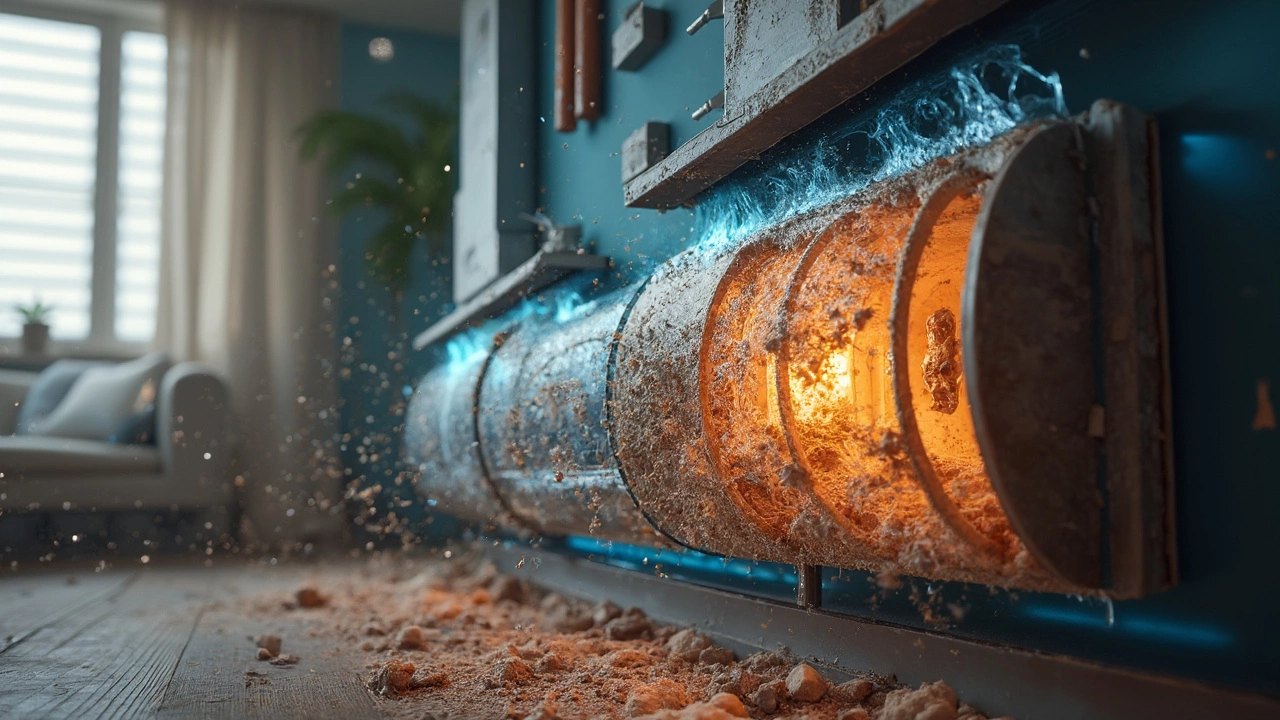 Apr, 15 2025
Apr, 15 2025
Ever notice that your allergies act up more often when you’re inside? It could be your air filter asking for some TLC. Air filters play a huge role in keeping the air inside your home fresh and breathable. But when they’re clogged and dirty, they can’t do their thing. And that’s when things can go all wrong.
Ignoring your air filters might seem like no big deal, but trust me, it’s not. When you neglect them, it’s not just about a bit of extra dust—your whole home’s comfort level takes a hit. Dirty air filters can mess with how well your home heating and cooling work, leading to uneven temperatures and soaring energy bills. Plus, the air you'll be breathing? Well, let's just say it’s not the kind you'd want.
- Why Air Filtration Matters
- Consequences of Neglecting Air Filters
- Impact on Health and Comfort
- Financial Costs of Dirty Filters
- Tips for Regular Maintenance
Why Air Filtration Matters
You might not think much about your air filters, but they’re the unsung heroes in keeping your house comfy and healthy. Every time your heating or cooling system kicks on, these filters work hard, catching dust, pet dander, and pollen. Without them, all those nasties would just float around, making your allergies worse or even leading to respiratory problems. It’s like the difference between breathing fresh outdoor air and being stuck in a smoky room.
The stakes are pretty high. Not only do these tiny filters help with the air you breathe, but they also keep your entire HVAC system in top shape. A clean filter makes sure that air flows freely, meaning your system doesn’t have to work double-time to heat or cool your home. Trust me, your bills will be a lot easier to handle if your system isn’t straining itself all the time.
Here's a wild fact: According to the EPA, indoor air can be two to five times more polluted than outdoor air! That’s why cleaning or swapping out your air filters regularly is crucial. It keeps those indoor pollutants at bay, which is especially important if you or anyone in your home has asthma or allergies.
In short, skipping out on air filter maintenance is like trying to win a race with a flat tire. Sure, you’ll get moving, but not without unnecessary struggle and cost down the line.
Consequences of Neglecting Air Filters
Not giving attention to your air filters can set off a chain of not-so-great events. Let’s dig into what actually happens when these filters are left to gather dust.
First off, dirty air filters are bad news for your home's air quality. They allow dust, pollen, and even mold spores to fly around, which is a recipe for allergies and stuffy noses. It's not just about discomfort; this can seriously affect people with asthma or respiratory issues.
Your home's heating and cooling systems also suffer. Imagine them as workhorses trying to do their job with a bag over their heads. A clogged filter makes your HVAC system work double time to circulate air, leading to significant wear and tear. Over time, this can mean frequent repairs or, worse yet, a full system breakdown.
Want to know how this impacts your wallet? A dirty filter can increase your energy bill by 5% to 15% because your system is using more power to push air through the gunk. Over a year, that could really add up.
There's also the issue of reduced comfort. Uneven air flow can cause some rooms to be too hot or too cold, making it impossible to find that sweet spot of comfort.
And if you're still not convinced, regular maintenance of air filters can extend the life of your HVAC system, saving you loads of money in the long run. It's a small step that prevents a lot of headaches.

Impact on Health and Comfort
Breathing in good air is kind of a big deal. When your air filters are clogged, they let all sorts of nasty stuff loose in your home. This isn't just about sneezing and coughing a little more; it can actually lead to serious health issues, especially if you or someone in your family has allergies or asthma.
Filters that are full of dust and gunk don't trap allergens and bacteria, so those little pests circulate freely. You might think you're safe indoors, but with clogged filters, your air quality might be worse than outside. If the filter is jam-packed, it can even let mold spores slip through—something you definitely don't want in your lungs.
This isn't just about health, either. Comfort-wise, your home should be a sanctuary. Dirty filters make your HVAC system work overtime, struggling to maintain a consistent temperature. Ever felt that some rooms in your house are hotter or colder than others? A filthy air filter could be the culprit. And an overworking system often means higher energy bills, which is definitely not comfortable for your wallet.
For those who love stats, here’s a fun fact: according to some HVAC experts, changing your dirty filters can improve your efficiency by up to 15%. It's not just about saving energy; it’s about creating a healthier breathing space for you and your loved ones.
So, maintaining fresh air filters is like a win-win: breathe better and keep comfy without stressing your budget. Keep those filters clean, and your lungs and wallet will thank you.
Financial Costs of Dirty Filters
Ever wonder why your energy bills are creeping up each month? A clogged air filter might be the invisible culprit. When air filters are neglected, they get all packed up with dust and debris, making it tougher for your HVAC system to do its job. So, your system has to work overtime to push air through the gunk—using more energy and causing your bills to jump up.
Here's the deal: HVAC systems are designed to run efficiently with clean filters. According to the Department of Energy, replacing a dirty filter with a clean one can lower your air conditioner's energy consumption by 5% to 15%. It's like giving your system a tiny spa day!
Now, think about maintenance costs. A strained HVAC system isn't just thirsty for power; it's also prone to breakdowns. Imagine the hassle and expense of an emergency repair visit, or worse, having to replace major components that wore out sooner than they should have. Regular filter maintenance can help extend the life of your system, saving you big bucks on repairs or replacements down the line.
And let’s not forget the hidden costs: the reduced lifespan of your HVAC system. Systems with clogged filters may wear out much faster, pushing you towards a full system replacement sooner than you'd planned. Considering that a new HVAC setup can cost anywhere from $5,000 to $10,000, it's a no-brainer to keep those filters clean and running smoothly.
So, next time you're tempted to skip checking your air filter, remember—those few bucks and minutes spent on a new filter can save you hundreds, or even thousands, in the long run. It's all about playing the long game when it comes to home maintenance.

Tips for Regular Maintenance
Keeping your home’s air filters clean and efficient doesn't have to be a huge task. A little regular upkeep can go a long way in maintaining good air quality and preventing your HVAC system from working overtime.
First things first, make it a habit to check your filters every 30 to 60 days. You could even set a reminder on your phone. If you have pets, or if you live in a particularly dusty area, you might need to peek at them more often.
It's not just about checking though. If your filter looks full of dust and dirt, it's time for a change. Here’s a quick guide:
- Turn off your HVAC unit to avoid bits of dust from circulating while you change the filter.
- Carefully slide the old filter out, keeping it upright to avoid spilling dust everywhere.
- Insert the new filter, making sure the arrows on the filter match the airflow direction in your system.
And here’s a handy tip: keep spare filters on hand so you don’t have to run to the store every time one needs changing.
Check your manufacturer's guidelines for specific instructions, as not all air filters are created equal. As industry expert Bill Whitman puts it,
“The right filter can maximize comfort and energy savings, but only if you follow the maintenance schedule.”
Using a smart thermostat or air quality monitor can also help. They offer reminders and give insights into when you’re due for a filter swap based on air quality changes.
Lastly, keep an eye on energy bills. A sudden spike might just be your system screaming for a new filter!